University Land Law Assignment: Title and Property Rights
VerifiedAdded on 2020/05/28
|12
|2649
|343
Homework Assignment
AI Summary
This assignment analyzes land law principles, particularly focusing on the concepts of equitable and legal title within the context of beneficial joint tenants. The assignment delves into the Law of Property Act 1925, exploring the rights and responsibilities associated with property ownership, including exclusive rights, developmental rights, and conveyance rights. The case study examines a scenario involving multiple beneficial joint tenants and their interactions with the property, including the implications of death, bankruptcy, and mortgages on title transfer. The document explains the distinction between legal and equitable title, the impact of bankruptcy on property rights, and the process of mortgage financing. The assignment offers insights into the rights of joint tenants, the role of trustees, and the legal framework governing property ownership and transfer, providing a comprehensive overview of these critical land law concepts.

Running head: LAND LAWS
Land Laws
Name of the Student
Name of the University
Author Note
Land Laws
Name of the Student
Name of the University
Author Note
Paraphrase This Document
Need a fresh take? Get an instant paraphrase of this document with our AI Paraphraser
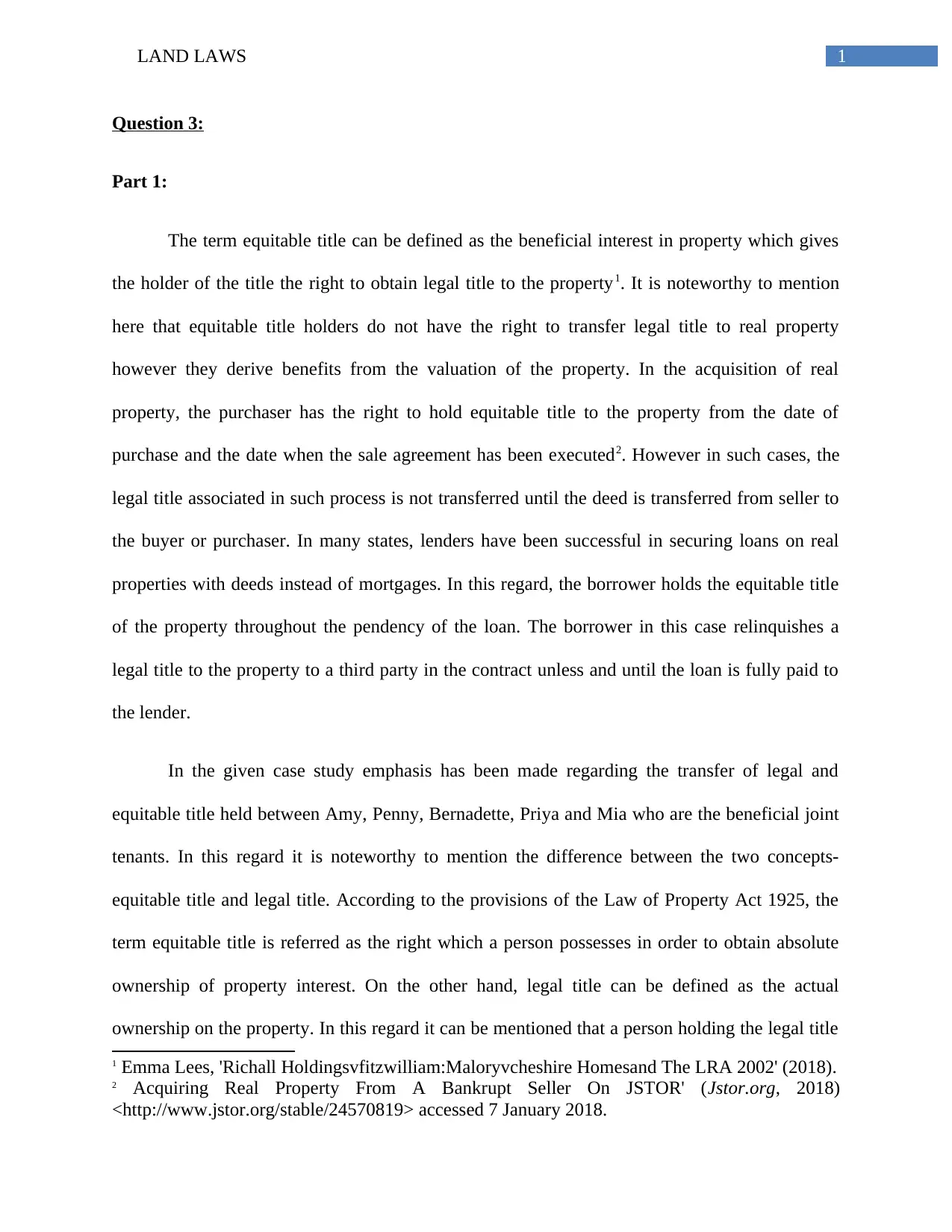
1LAND LAWS
Question 3:
Part 1:
The term equitable title can be defined as the beneficial interest in property which gives
the holder of the title the right to obtain legal title to the property1. It is noteworthy to mention
here that equitable title holders do not have the right to transfer legal title to real property
however they derive benefits from the valuation of the property. In the acquisition of real
property, the purchaser has the right to hold equitable title to the property from the date of
purchase and the date when the sale agreement has been executed2. However in such cases, the
legal title associated in such process is not transferred until the deed is transferred from seller to
the buyer or purchaser. In many states, lenders have been successful in securing loans on real
properties with deeds instead of mortgages. In this regard, the borrower holds the equitable title
of the property throughout the pendency of the loan. The borrower in this case relinquishes a
legal title to the property to a third party in the contract unless and until the loan is fully paid to
the lender.
In the given case study emphasis has been made regarding the transfer of legal and
equitable title held between Amy, Penny, Bernadette, Priya and Mia who are the beneficial joint
tenants. In this regard it is noteworthy to mention the difference between the two concepts-
equitable title and legal title. According to the provisions of the Law of Property Act 1925, the
term equitable title is referred as the right which a person possesses in order to obtain absolute
ownership of property interest. On the other hand, legal title can be defined as the actual
ownership on the property. In this regard it can be mentioned that a person holding the legal title
1 Emma Lees, 'Richall Holdingsvfitzwilliam:Maloryvcheshire Homesand The LRA 2002' (2018).
2 Acquiring Real Property From A Bankrupt Seller On JSTOR' (Jstor.org, 2018)
<http://www.jstor.org/stable/24570819> accessed 7 January 2018.
Question 3:
Part 1:
The term equitable title can be defined as the beneficial interest in property which gives
the holder of the title the right to obtain legal title to the property1. It is noteworthy to mention
here that equitable title holders do not have the right to transfer legal title to real property
however they derive benefits from the valuation of the property. In the acquisition of real
property, the purchaser has the right to hold equitable title to the property from the date of
purchase and the date when the sale agreement has been executed2. However in such cases, the
legal title associated in such process is not transferred until the deed is transferred from seller to
the buyer or purchaser. In many states, lenders have been successful in securing loans on real
properties with deeds instead of mortgages. In this regard, the borrower holds the equitable title
of the property throughout the pendency of the loan. The borrower in this case relinquishes a
legal title to the property to a third party in the contract unless and until the loan is fully paid to
the lender.
In the given case study emphasis has been made regarding the transfer of legal and
equitable title held between Amy, Penny, Bernadette, Priya and Mia who are the beneficial joint
tenants. In this regard it is noteworthy to mention the difference between the two concepts-
equitable title and legal title. According to the provisions of the Law of Property Act 1925, the
term equitable title is referred as the right which a person possesses in order to obtain absolute
ownership of property interest. On the other hand, legal title can be defined as the actual
ownership on the property. In this regard it can be mentioned that a person holding the legal title
1 Emma Lees, 'Richall Holdingsvfitzwilliam:Maloryvcheshire Homesand The LRA 2002' (2018).
2 Acquiring Real Property From A Bankrupt Seller On JSTOR' (Jstor.org, 2018)
<http://www.jstor.org/stable/24570819> accessed 7 January 2018.
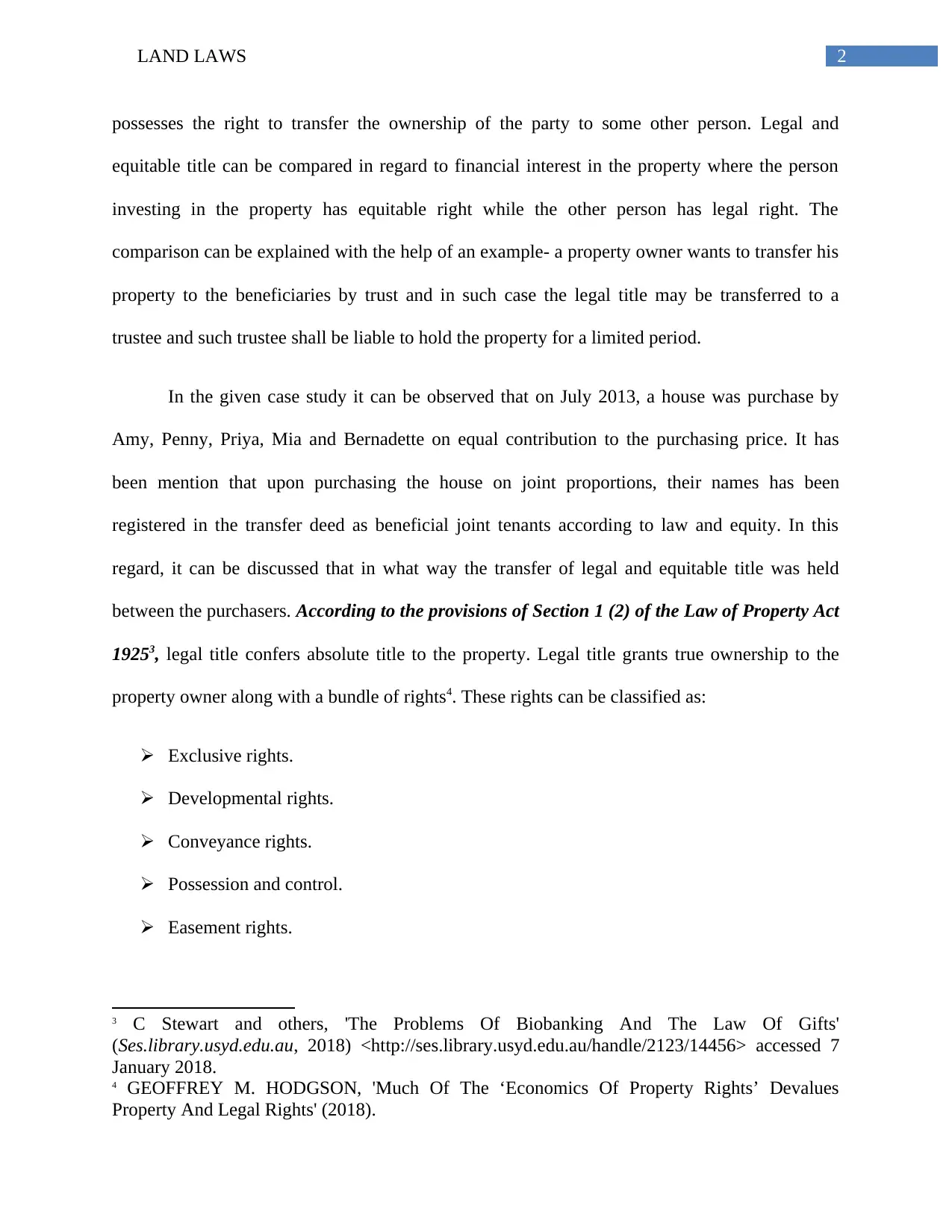
2LAND LAWS
possesses the right to transfer the ownership of the party to some other person. Legal and
equitable title can be compared in regard to financial interest in the property where the person
investing in the property has equitable right while the other person has legal right. The
comparison can be explained with the help of an example- a property owner wants to transfer his
property to the beneficiaries by trust and in such case the legal title may be transferred to a
trustee and such trustee shall be liable to hold the property for a limited period.
In the given case study it can be observed that on July 2013, a house was purchase by
Amy, Penny, Priya, Mia and Bernadette on equal contribution to the purchasing price. It has
been mention that upon purchasing the house on joint proportions, their names has been
registered in the transfer deed as beneficial joint tenants according to law and equity. In this
regard, it can be discussed that in what way the transfer of legal and equitable title was held
between the purchasers. According to the provisions of Section 1 (2) of the Law of Property Act
19253, legal title confers absolute title to the property. Legal title grants true ownership to the
property owner along with a bundle of rights4. These rights can be classified as:
Exclusive rights.
Developmental rights.
Conveyance rights.
Possession and control.
Easement rights.
3 C Stewart and others, 'The Problems Of Biobanking And The Law Of Gifts'
(Ses.library.usyd.edu.au, 2018) <http://ses.library.usyd.edu.au/handle/2123/14456> accessed 7
January 2018.
4 GEOFFREY M. HODGSON, 'Much Of The ‘Economics Of Property Rights’ Devalues
Property And Legal Rights' (2018).
possesses the right to transfer the ownership of the party to some other person. Legal and
equitable title can be compared in regard to financial interest in the property where the person
investing in the property has equitable right while the other person has legal right. The
comparison can be explained with the help of an example- a property owner wants to transfer his
property to the beneficiaries by trust and in such case the legal title may be transferred to a
trustee and such trustee shall be liable to hold the property for a limited period.
In the given case study it can be observed that on July 2013, a house was purchase by
Amy, Penny, Priya, Mia and Bernadette on equal contribution to the purchasing price. It has
been mention that upon purchasing the house on joint proportions, their names has been
registered in the transfer deed as beneficial joint tenants according to law and equity. In this
regard, it can be discussed that in what way the transfer of legal and equitable title was held
between the purchasers. According to the provisions of Section 1 (2) of the Law of Property Act
19253, legal title confers absolute title to the property. Legal title grants true ownership to the
property owner along with a bundle of rights4. These rights can be classified as:
Exclusive rights.
Developmental rights.
Conveyance rights.
Possession and control.
Easement rights.
3 C Stewart and others, 'The Problems Of Biobanking And The Law Of Gifts'
(Ses.library.usyd.edu.au, 2018) <http://ses.library.usyd.edu.au/handle/2123/14456> accessed 7
January 2018.
4 GEOFFREY M. HODGSON, 'Much Of The ‘Economics Of Property Rights’ Devalues
Property And Legal Rights' (2018).
⊘ This is a preview!⊘
Do you want full access?
Subscribe today to unlock all pages.

Trusted by 1+ million students worldwide
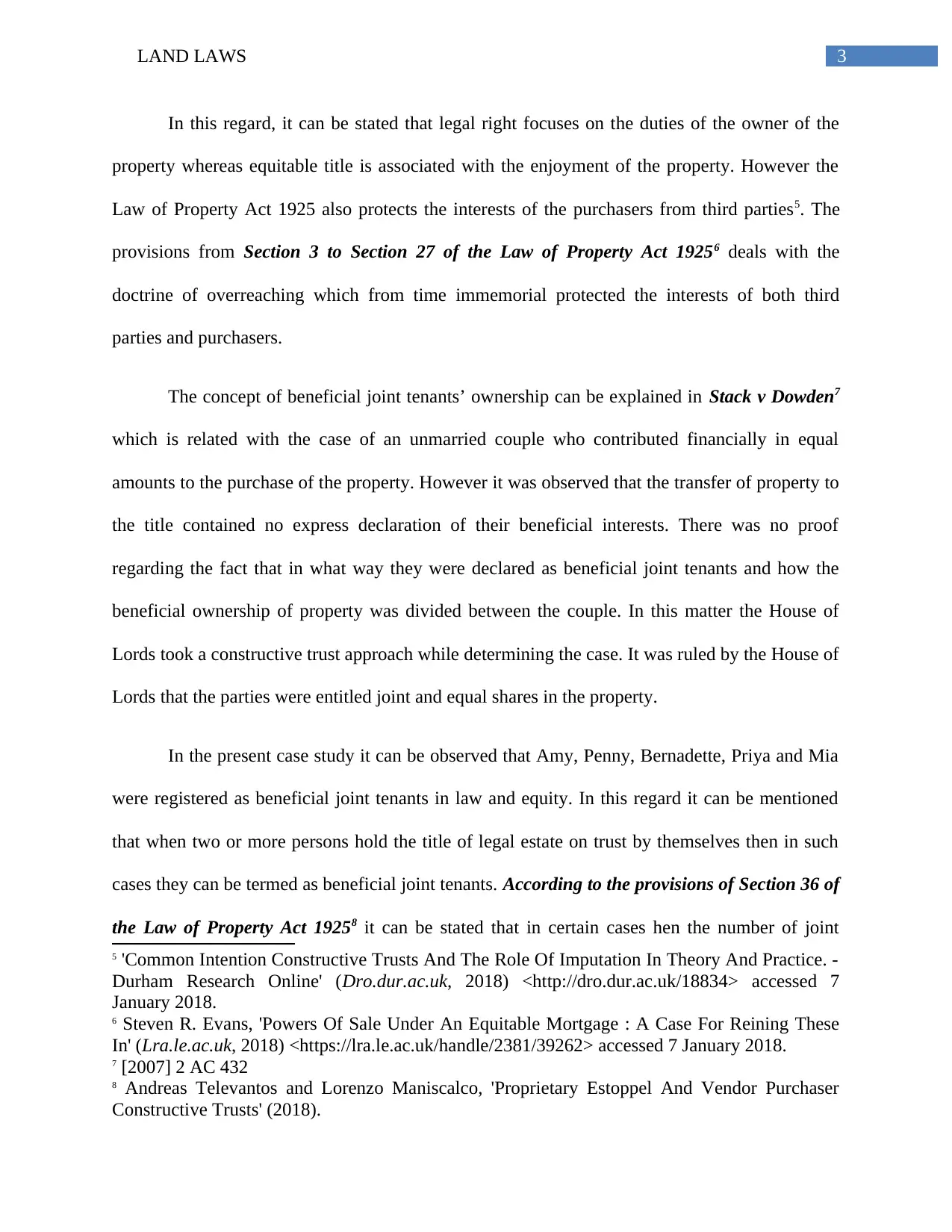
3LAND LAWS
In this regard, it can be stated that legal right focuses on the duties of the owner of the
property whereas equitable title is associated with the enjoyment of the property. However the
Law of Property Act 1925 also protects the interests of the purchasers from third parties5. The
provisions from Section 3 to Section 27 of the Law of Property Act 19256 deals with the
doctrine of overreaching which from time immemorial protected the interests of both third
parties and purchasers.
The concept of beneficial joint tenants’ ownership can be explained in Stack v Dowden7
which is related with the case of an unmarried couple who contributed financially in equal
amounts to the purchase of the property. However it was observed that the transfer of property to
the title contained no express declaration of their beneficial interests. There was no proof
regarding the fact that in what way they were declared as beneficial joint tenants and how the
beneficial ownership of property was divided between the couple. In this matter the House of
Lords took a constructive trust approach while determining the case. It was ruled by the House of
Lords that the parties were entitled joint and equal shares in the property.
In the present case study it can be observed that Amy, Penny, Bernadette, Priya and Mia
were registered as beneficial joint tenants in law and equity. In this regard it can be mentioned
that when two or more persons hold the title of legal estate on trust by themselves then in such
cases they can be termed as beneficial joint tenants. According to the provisions of Section 36 of
the Law of Property Act 19258 it can be stated that in certain cases hen the number of joint
5 'Common Intention Constructive Trusts And The Role Of Imputation In Theory And Practice. -
Durham Research Online' (Dro.dur.ac.uk, 2018) <http://dro.dur.ac.uk/18834> accessed 7
January 2018.
6 Steven R. Evans, 'Powers Of Sale Under An Equitable Mortgage : A Case For Reining These
In' (Lra.le.ac.uk, 2018) <https://lra.le.ac.uk/handle/2381/39262> accessed 7 January 2018.
7 [2007] 2 AC 432
8 Andreas Televantos and Lorenzo Maniscalco, 'Proprietary Estoppel And Vendor Purchaser
Constructive Trusts' (2018).
In this regard, it can be stated that legal right focuses on the duties of the owner of the
property whereas equitable title is associated with the enjoyment of the property. However the
Law of Property Act 1925 also protects the interests of the purchasers from third parties5. The
provisions from Section 3 to Section 27 of the Law of Property Act 19256 deals with the
doctrine of overreaching which from time immemorial protected the interests of both third
parties and purchasers.
The concept of beneficial joint tenants’ ownership can be explained in Stack v Dowden7
which is related with the case of an unmarried couple who contributed financially in equal
amounts to the purchase of the property. However it was observed that the transfer of property to
the title contained no express declaration of their beneficial interests. There was no proof
regarding the fact that in what way they were declared as beneficial joint tenants and how the
beneficial ownership of property was divided between the couple. In this matter the House of
Lords took a constructive trust approach while determining the case. It was ruled by the House of
Lords that the parties were entitled joint and equal shares in the property.
In the present case study it can be observed that Amy, Penny, Bernadette, Priya and Mia
were registered as beneficial joint tenants in law and equity. In this regard it can be mentioned
that when two or more persons hold the title of legal estate on trust by themselves then in such
cases they can be termed as beneficial joint tenants. According to the provisions of Section 36 of
the Law of Property Act 19258 it can be stated that in certain cases hen the number of joint
5 'Common Intention Constructive Trusts And The Role Of Imputation In Theory And Practice. -
Durham Research Online' (Dro.dur.ac.uk, 2018) <http://dro.dur.ac.uk/18834> accessed 7
January 2018.
6 Steven R. Evans, 'Powers Of Sale Under An Equitable Mortgage : A Case For Reining These
In' (Lra.le.ac.uk, 2018) <https://lra.le.ac.uk/handle/2381/39262> accessed 7 January 2018.
7 [2007] 2 AC 432
8 Andreas Televantos and Lorenzo Maniscalco, 'Proprietary Estoppel And Vendor Purchaser
Constructive Trusts' (2018).
Paraphrase This Document
Need a fresh take? Get an instant paraphrase of this document with our AI Paraphraser
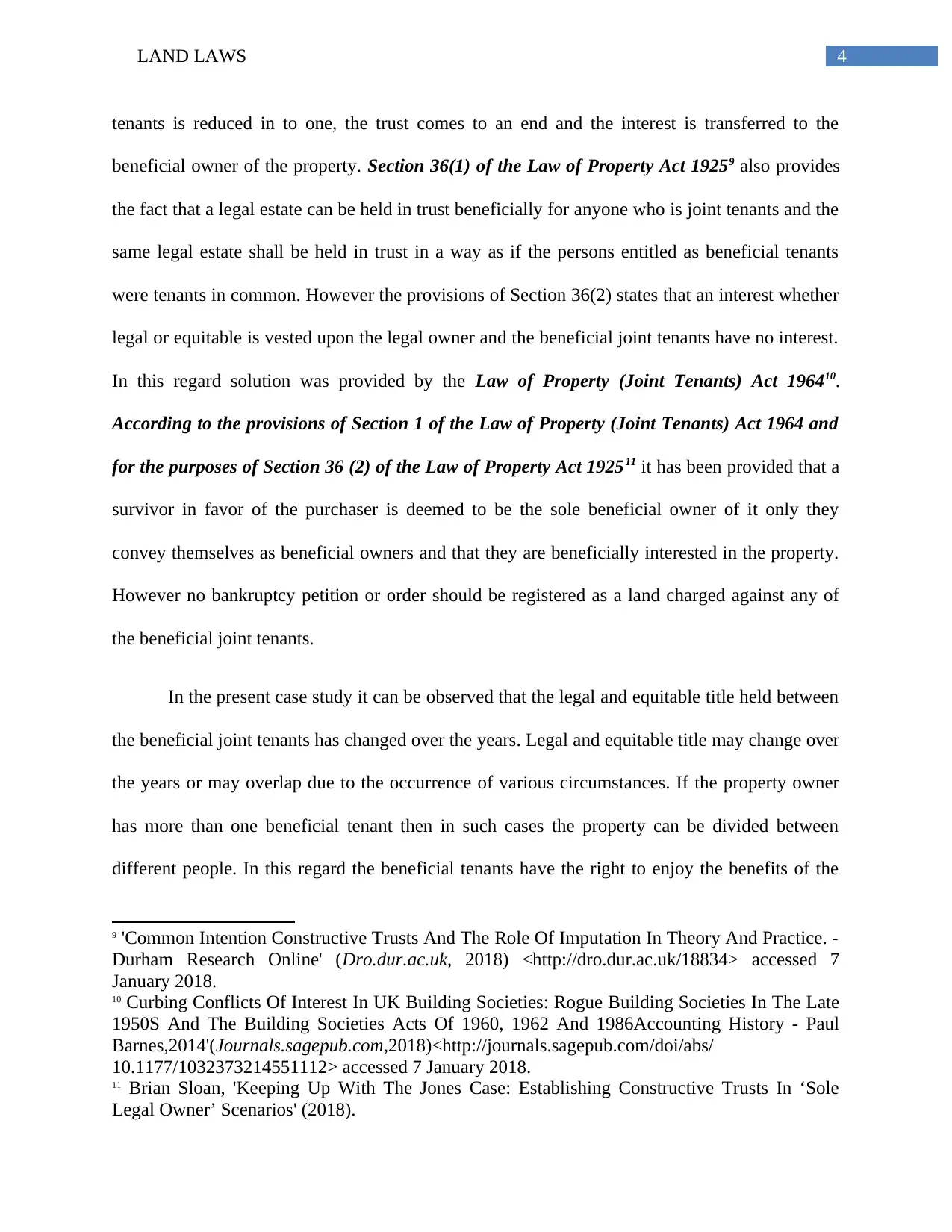
4LAND LAWS
tenants is reduced in to one, the trust comes to an end and the interest is transferred to the
beneficial owner of the property. Section 36(1) of the Law of Property Act 19259 also provides
the fact that a legal estate can be held in trust beneficially for anyone who is joint tenants and the
same legal estate shall be held in trust in a way as if the persons entitled as beneficial tenants
were tenants in common. However the provisions of Section 36(2) states that an interest whether
legal or equitable is vested upon the legal owner and the beneficial joint tenants have no interest.
In this regard solution was provided by the Law of Property (Joint Tenants) Act 196410.
According to the provisions of Section 1 of the Law of Property (Joint Tenants) Act 1964 and
for the purposes of Section 36 (2) of the Law of Property Act 192511 it has been provided that a
survivor in favor of the purchaser is deemed to be the sole beneficial owner of it only they
convey themselves as beneficial owners and that they are beneficially interested in the property.
However no bankruptcy petition or order should be registered as a land charged against any of
the beneficial joint tenants.
In the present case study it can be observed that the legal and equitable title held between
the beneficial joint tenants has changed over the years. Legal and equitable title may change over
the years or may overlap due to the occurrence of various circumstances. If the property owner
has more than one beneficial tenant then in such cases the property can be divided between
different people. In this regard the beneficial tenants have the right to enjoy the benefits of the
9 'Common Intention Constructive Trusts And The Role Of Imputation In Theory And Practice. -
Durham Research Online' (Dro.dur.ac.uk, 2018) <http://dro.dur.ac.uk/18834> accessed 7
January 2018.
10 Curbing Conflicts Of Interest In UK Building Societies: Rogue Building Societies In The Late
1950S And The Building Societies Acts Of 1960, 1962 And 1986Accounting History - Paul
Barnes,2014'(Journals.sagepub.com,2018)<http://journals.sagepub.com/doi/abs/
10.1177/1032373214551112> accessed 7 January 2018.
11 Brian Sloan, 'Keeping Up With The Jones Case: Establishing Constructive Trusts In ‘Sole
Legal Owner’ Scenarios' (2018).
tenants is reduced in to one, the trust comes to an end and the interest is transferred to the
beneficial owner of the property. Section 36(1) of the Law of Property Act 19259 also provides
the fact that a legal estate can be held in trust beneficially for anyone who is joint tenants and the
same legal estate shall be held in trust in a way as if the persons entitled as beneficial tenants
were tenants in common. However the provisions of Section 36(2) states that an interest whether
legal or equitable is vested upon the legal owner and the beneficial joint tenants have no interest.
In this regard solution was provided by the Law of Property (Joint Tenants) Act 196410.
According to the provisions of Section 1 of the Law of Property (Joint Tenants) Act 1964 and
for the purposes of Section 36 (2) of the Law of Property Act 192511 it has been provided that a
survivor in favor of the purchaser is deemed to be the sole beneficial owner of it only they
convey themselves as beneficial owners and that they are beneficially interested in the property.
However no bankruptcy petition or order should be registered as a land charged against any of
the beneficial joint tenants.
In the present case study it can be observed that the legal and equitable title held between
the beneficial joint tenants has changed over the years. Legal and equitable title may change over
the years or may overlap due to the occurrence of various circumstances. If the property owner
has more than one beneficial tenant then in such cases the property can be divided between
different people. In this regard the beneficial tenants have the right to enjoy the benefits of the
9 'Common Intention Constructive Trusts And The Role Of Imputation In Theory And Practice. -
Durham Research Online' (Dro.dur.ac.uk, 2018) <http://dro.dur.ac.uk/18834> accessed 7
January 2018.
10 Curbing Conflicts Of Interest In UK Building Societies: Rogue Building Societies In The Late
1950S And The Building Societies Acts Of 1960, 1962 And 1986Accounting History - Paul
Barnes,2014'(Journals.sagepub.com,2018)<http://journals.sagepub.com/doi/abs/
10.1177/1032373214551112> accessed 7 January 2018.
11 Brian Sloan, 'Keeping Up With The Jones Case: Establishing Constructive Trusts In ‘Sole
Legal Owner’ Scenarios' (2018).
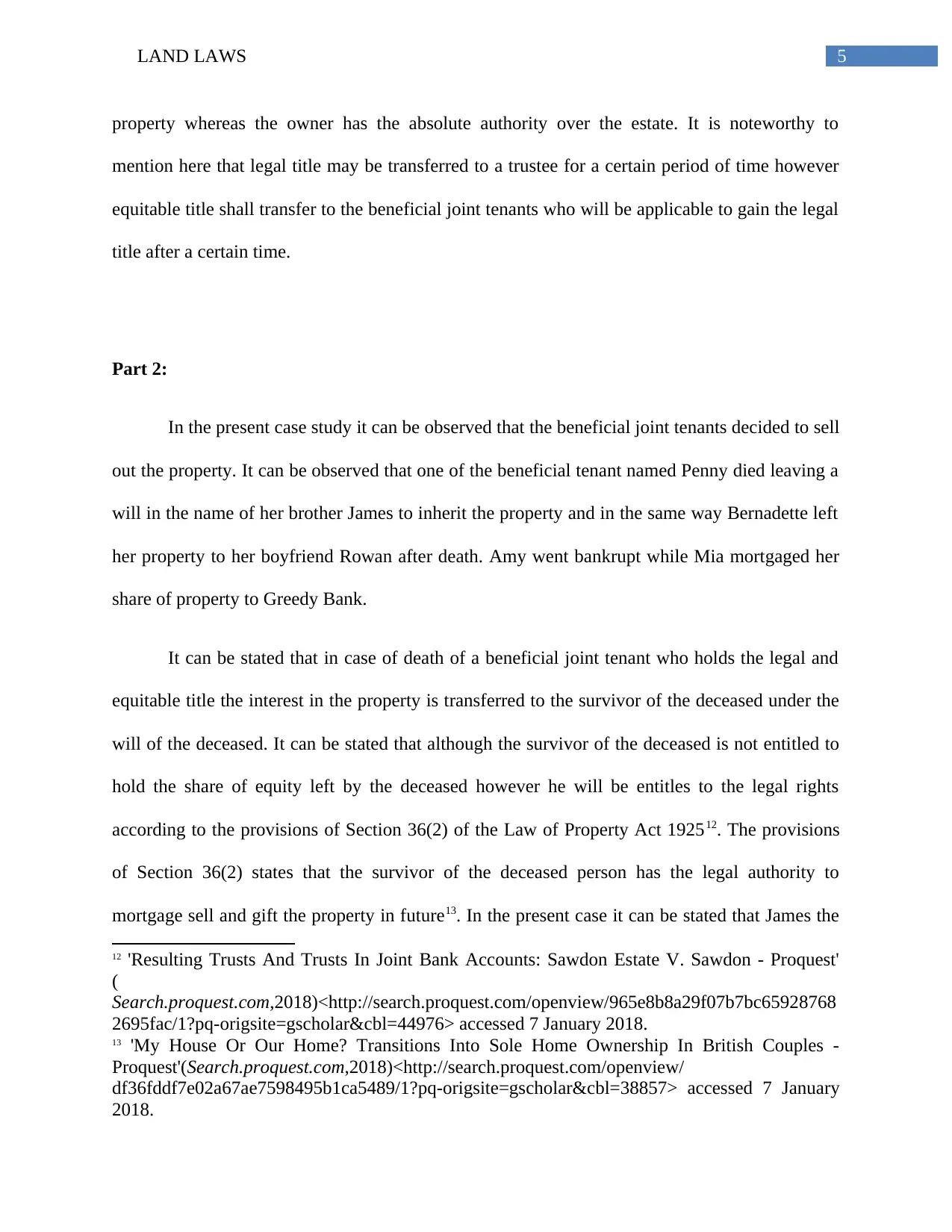
5LAND LAWS
property whereas the owner has the absolute authority over the estate. It is noteworthy to
mention here that legal title may be transferred to a trustee for a certain period of time however
equitable title shall transfer to the beneficial joint tenants who will be applicable to gain the legal
title after a certain time.
Part 2:
In the present case study it can be observed that the beneficial joint tenants decided to sell
out the property. It can be observed that one of the beneficial tenant named Penny died leaving a
will in the name of her brother James to inherit the property and in the same way Bernadette left
her property to her boyfriend Rowan after death. Amy went bankrupt while Mia mortgaged her
share of property to Greedy Bank.
It can be stated that in case of death of a beneficial joint tenant who holds the legal and
equitable title the interest in the property is transferred to the survivor of the deceased under the
will of the deceased. It can be stated that although the survivor of the deceased is not entitled to
hold the share of equity left by the deceased however he will be entitles to the legal rights
according to the provisions of Section 36(2) of the Law of Property Act 192512. The provisions
of Section 36(2) states that the survivor of the deceased person has the legal authority to
mortgage sell and gift the property in future13. In the present case it can be stated that James the
12 'Resulting Trusts And Trusts In Joint Bank Accounts: Sawdon Estate V. Sawdon - Proquest'
(
Search.proquest.com,2018)<http://search.proquest.com/openview/965e8b8a29f07b7bc65928768
2695fac/1?pq-origsite=gscholar&cbl=44976> accessed 7 January 2018.
13 'My House Or Our Home? Transitions Into Sole Home Ownership In British Couples -
Proquest'(Search.proquest.com,2018)<http://search.proquest.com/openview/
df36fddf7e02a67ae7598495b1ca5489/1?pq-origsite=gscholar&cbl=38857> accessed 7 January
2018.
property whereas the owner has the absolute authority over the estate. It is noteworthy to
mention here that legal title may be transferred to a trustee for a certain period of time however
equitable title shall transfer to the beneficial joint tenants who will be applicable to gain the legal
title after a certain time.
Part 2:
In the present case study it can be observed that the beneficial joint tenants decided to sell
out the property. It can be observed that one of the beneficial tenant named Penny died leaving a
will in the name of her brother James to inherit the property and in the same way Bernadette left
her property to her boyfriend Rowan after death. Amy went bankrupt while Mia mortgaged her
share of property to Greedy Bank.
It can be stated that in case of death of a beneficial joint tenant who holds the legal and
equitable title the interest in the property is transferred to the survivor of the deceased under the
will of the deceased. It can be stated that although the survivor of the deceased is not entitled to
hold the share of equity left by the deceased however he will be entitles to the legal rights
according to the provisions of Section 36(2) of the Law of Property Act 192512. The provisions
of Section 36(2) states that the survivor of the deceased person has the legal authority to
mortgage sell and gift the property in future13. In the present case it can be stated that James the
12 'Resulting Trusts And Trusts In Joint Bank Accounts: Sawdon Estate V. Sawdon - Proquest'
(
Search.proquest.com,2018)<http://search.proquest.com/openview/965e8b8a29f07b7bc65928768
2695fac/1?pq-origsite=gscholar&cbl=44976> accessed 7 January 2018.
13 'My House Or Our Home? Transitions Into Sole Home Ownership In British Couples -
Proquest'(Search.proquest.com,2018)<http://search.proquest.com/openview/
df36fddf7e02a67ae7598495b1ca5489/1?pq-origsite=gscholar&cbl=38857> accessed 7 January
2018.
⊘ This is a preview!⊘
Do you want full access?
Subscribe today to unlock all pages.

Trusted by 1+ million students worldwide
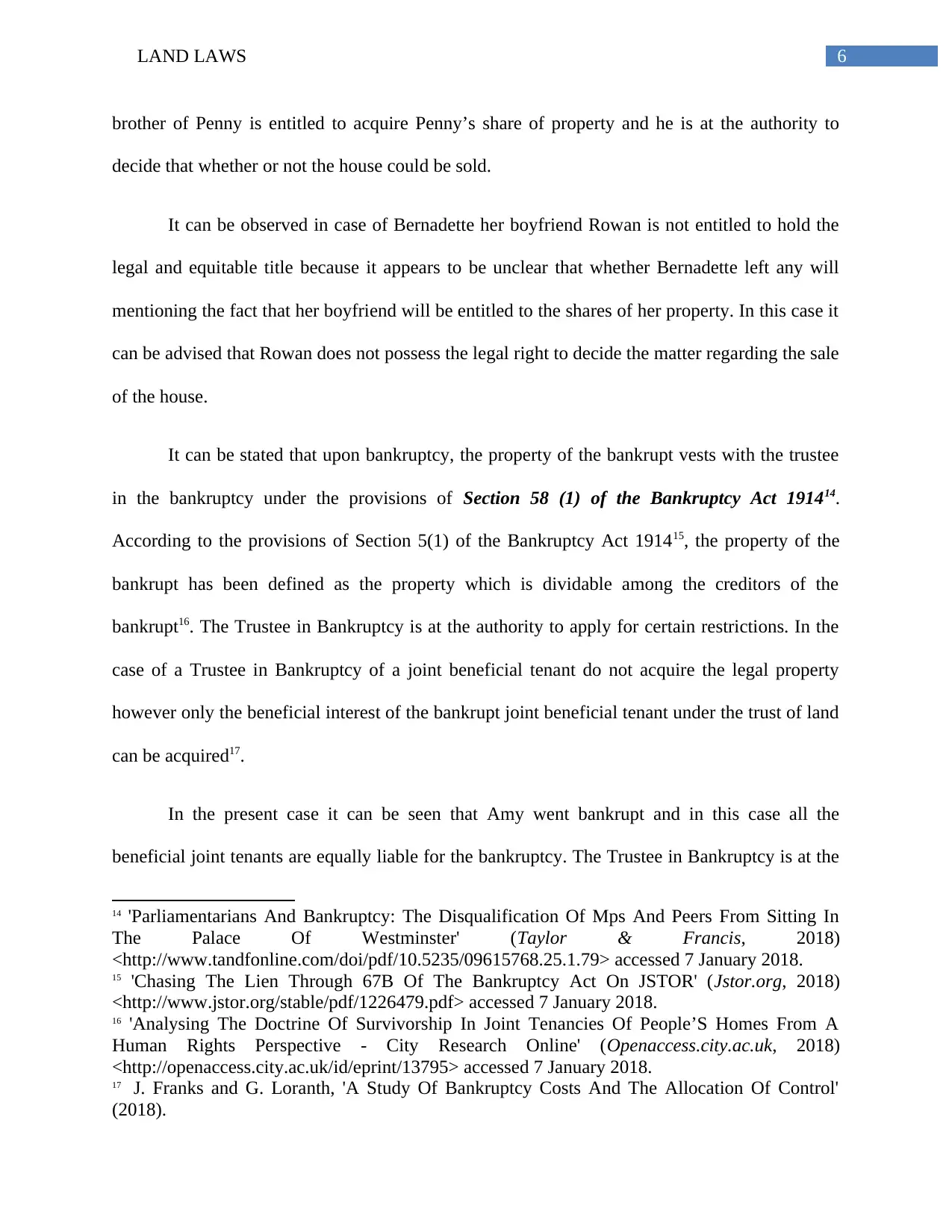
6LAND LAWS
brother of Penny is entitled to acquire Penny’s share of property and he is at the authority to
decide that whether or not the house could be sold.
It can be observed in case of Bernadette her boyfriend Rowan is not entitled to hold the
legal and equitable title because it appears to be unclear that whether Bernadette left any will
mentioning the fact that her boyfriend will be entitled to the shares of her property. In this case it
can be advised that Rowan does not possess the legal right to decide the matter regarding the sale
of the house.
It can be stated that upon bankruptcy, the property of the bankrupt vests with the trustee
in the bankruptcy under the provisions of Section 58 (1) of the Bankruptcy Act 191414.
According to the provisions of Section 5(1) of the Bankruptcy Act 191415, the property of the
bankrupt has been defined as the property which is dividable among the creditors of the
bankrupt16. The Trustee in Bankruptcy is at the authority to apply for certain restrictions. In the
case of a Trustee in Bankruptcy of a joint beneficial tenant do not acquire the legal property
however only the beneficial interest of the bankrupt joint beneficial tenant under the trust of land
can be acquired17.
In the present case it can be seen that Amy went bankrupt and in this case all the
beneficial joint tenants are equally liable for the bankruptcy. The Trustee in Bankruptcy is at the
14 'Parliamentarians And Bankruptcy: The Disqualification Of Mps And Peers From Sitting In
The Palace Of Westminster' (Taylor & Francis, 2018)
<http://www.tandfonline.com/doi/pdf/10.5235/09615768.25.1.79> accessed 7 January 2018.
15 'Chasing The Lien Through 67B Of The Bankruptcy Act On JSTOR' (Jstor.org, 2018)
<http://www.jstor.org/stable/pdf/1226479.pdf> accessed 7 January 2018.
16 'Analysing The Doctrine Of Survivorship In Joint Tenancies Of People’S Homes From A
Human Rights Perspective - City Research Online' (Openaccess.city.ac.uk, 2018)
<http://openaccess.city.ac.uk/id/eprint/13795> accessed 7 January 2018.
17 J. Franks and G. Loranth, 'A Study Of Bankruptcy Costs And The Allocation Of Control'
(2018).
brother of Penny is entitled to acquire Penny’s share of property and he is at the authority to
decide that whether or not the house could be sold.
It can be observed in case of Bernadette her boyfriend Rowan is not entitled to hold the
legal and equitable title because it appears to be unclear that whether Bernadette left any will
mentioning the fact that her boyfriend will be entitled to the shares of her property. In this case it
can be advised that Rowan does not possess the legal right to decide the matter regarding the sale
of the house.
It can be stated that upon bankruptcy, the property of the bankrupt vests with the trustee
in the bankruptcy under the provisions of Section 58 (1) of the Bankruptcy Act 191414.
According to the provisions of Section 5(1) of the Bankruptcy Act 191415, the property of the
bankrupt has been defined as the property which is dividable among the creditors of the
bankrupt16. The Trustee in Bankruptcy is at the authority to apply for certain restrictions. In the
case of a Trustee in Bankruptcy of a joint beneficial tenant do not acquire the legal property
however only the beneficial interest of the bankrupt joint beneficial tenant under the trust of land
can be acquired17.
In the present case it can be seen that Amy went bankrupt and in this case all the
beneficial joint tenants are equally liable for the bankruptcy. The Trustee in Bankruptcy is at the
14 'Parliamentarians And Bankruptcy: The Disqualification Of Mps And Peers From Sitting In
The Palace Of Westminster' (Taylor & Francis, 2018)
<http://www.tandfonline.com/doi/pdf/10.5235/09615768.25.1.79> accessed 7 January 2018.
15 'Chasing The Lien Through 67B Of The Bankruptcy Act On JSTOR' (Jstor.org, 2018)
<http://www.jstor.org/stable/pdf/1226479.pdf> accessed 7 January 2018.
16 'Analysing The Doctrine Of Survivorship In Joint Tenancies Of People’S Homes From A
Human Rights Perspective - City Research Online' (Openaccess.city.ac.uk, 2018)
<http://openaccess.city.ac.uk/id/eprint/13795> accessed 7 January 2018.
17 J. Franks and G. Loranth, 'A Study Of Bankruptcy Costs And The Allocation Of Control'
(2018).
Paraphrase This Document
Need a fresh take? Get an instant paraphrase of this document with our AI Paraphraser
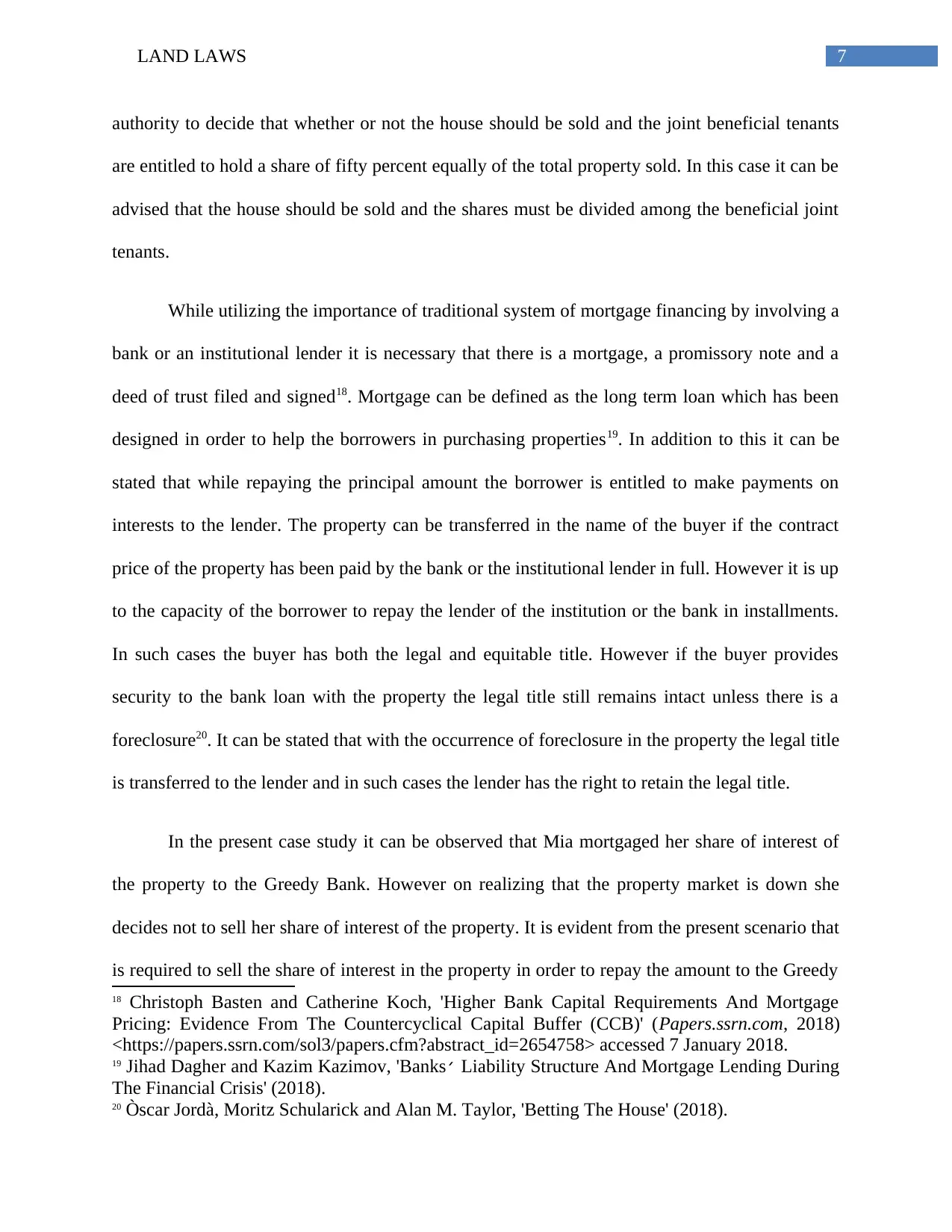
7LAND LAWS
authority to decide that whether or not the house should be sold and the joint beneficial tenants
are entitled to hold a share of fifty percent equally of the total property sold. In this case it can be
advised that the house should be sold and the shares must be divided among the beneficial joint
tenants.
While utilizing the importance of traditional system of mortgage financing by involving a
bank or an institutional lender it is necessary that there is a mortgage, a promissory note and a
deed of trust filed and signed18. Mortgage can be defined as the long term loan which has been
designed in order to help the borrowers in purchasing properties19. In addition to this it can be
stated that while repaying the principal amount the borrower is entitled to make payments on
interests to the lender. The property can be transferred in the name of the buyer if the contract
price of the property has been paid by the bank or the institutional lender in full. However it is up
to the capacity of the borrower to repay the lender of the institution or the bank in installments.
In such cases the buyer has both the legal and equitable title. However if the buyer provides
security to the bank loan with the property the legal title still remains intact unless there is a
foreclosure20. It can be stated that with the occurrence of foreclosure in the property the legal title
is transferred to the lender and in such cases the lender has the right to retain the legal title.
In the present case study it can be observed that Mia mortgaged her share of interest of
the property to the Greedy Bank. However on realizing that the property market is down she
decides not to sell her share of interest of the property. It is evident from the present scenario that
is required to sell the share of interest in the property in order to repay the amount to the Greedy
18 Christoph Basten and Catherine Koch, 'Higher Bank Capital Requirements And Mortgage
Pricing: Evidence From The Countercyclical Capital Buffer (CCB)' (Papers.ssrn.com, 2018)
<https://papers.ssrn.com/sol3/papers.cfm?abstract_id=2654758> accessed 7 January 2018.
19 Jihad Dagher and Kazim Kazimov, 'Banks׳ Liability Structure And Mortgage Lending During
The Financial Crisis' (2018).
20 Òscar Jordà, Moritz Schularick and Alan M. Taylor, 'Betting The House' (2018).
authority to decide that whether or not the house should be sold and the joint beneficial tenants
are entitled to hold a share of fifty percent equally of the total property sold. In this case it can be
advised that the house should be sold and the shares must be divided among the beneficial joint
tenants.
While utilizing the importance of traditional system of mortgage financing by involving a
bank or an institutional lender it is necessary that there is a mortgage, a promissory note and a
deed of trust filed and signed18. Mortgage can be defined as the long term loan which has been
designed in order to help the borrowers in purchasing properties19. In addition to this it can be
stated that while repaying the principal amount the borrower is entitled to make payments on
interests to the lender. The property can be transferred in the name of the buyer if the contract
price of the property has been paid by the bank or the institutional lender in full. However it is up
to the capacity of the borrower to repay the lender of the institution or the bank in installments.
In such cases the buyer has both the legal and equitable title. However if the buyer provides
security to the bank loan with the property the legal title still remains intact unless there is a
foreclosure20. It can be stated that with the occurrence of foreclosure in the property the legal title
is transferred to the lender and in such cases the lender has the right to retain the legal title.
In the present case study it can be observed that Mia mortgaged her share of interest of
the property to the Greedy Bank. However on realizing that the property market is down she
decides not to sell her share of interest of the property. It is evident from the present scenario that
is required to sell the share of interest in the property in order to repay the amount to the Greedy
18 Christoph Basten and Catherine Koch, 'Higher Bank Capital Requirements And Mortgage
Pricing: Evidence From The Countercyclical Capital Buffer (CCB)' (Papers.ssrn.com, 2018)
<https://papers.ssrn.com/sol3/papers.cfm?abstract_id=2654758> accessed 7 January 2018.
19 Jihad Dagher and Kazim Kazimov, 'Banks׳ Liability Structure And Mortgage Lending During
The Financial Crisis' (2018).
20 Òscar Jordà, Moritz Schularick and Alan M. Taylor, 'Betting The House' (2018).

8LAND LAWS
Bank. In this case it is advised that Mia should sell the house in order to repay the amount
borrowed otherwise the bank will be at the authority to retain the legal title.
Bank. In this case it is advised that Mia should sell the house in order to repay the amount
borrowed otherwise the bank will be at the authority to retain the legal title.
⊘ This is a preview!⊘
Do you want full access?
Subscribe today to unlock all pages.

Trusted by 1+ million students worldwide
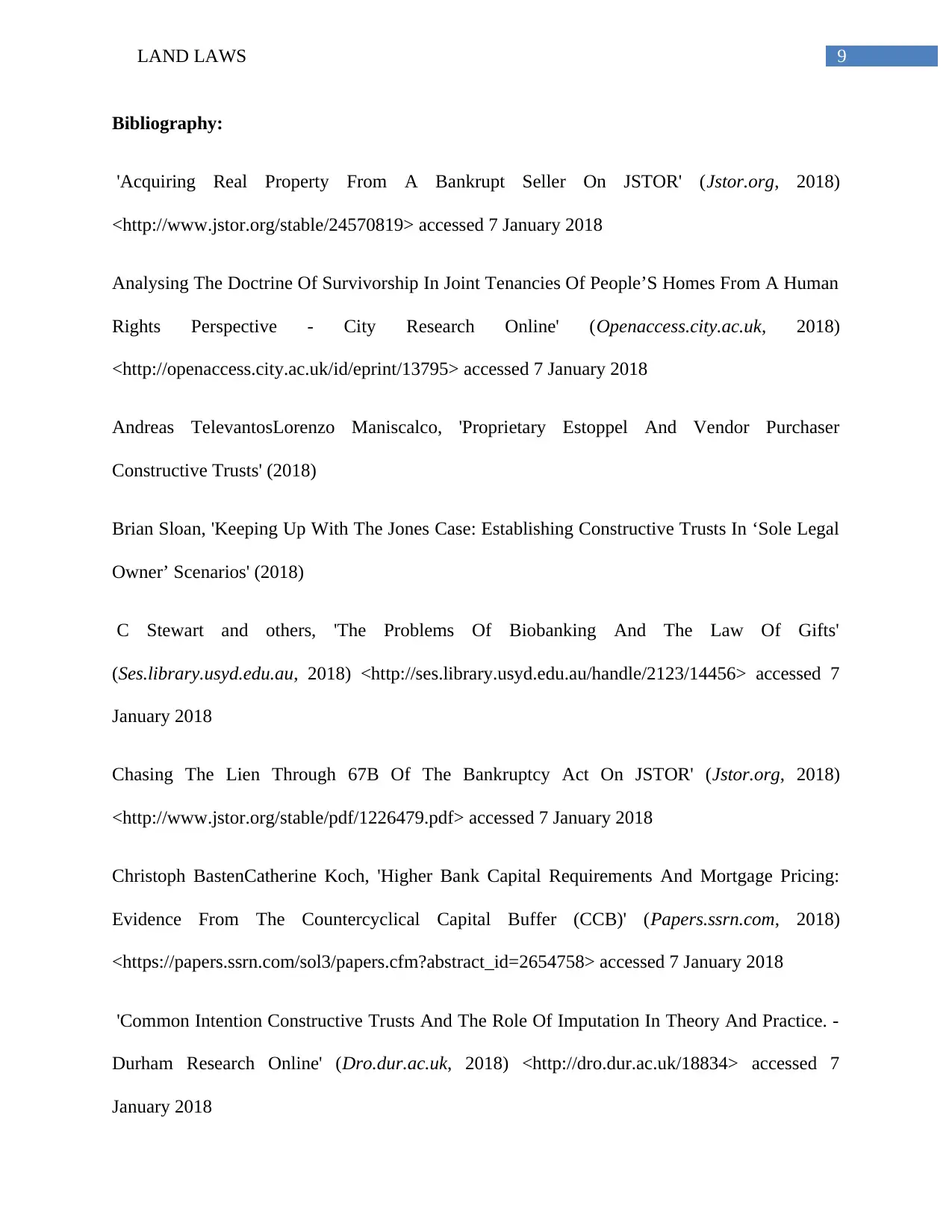
9LAND LAWS
Bibliography:
'Acquiring Real Property From A Bankrupt Seller On JSTOR' (Jstor.org, 2018)
<http://www.jstor.org/stable/24570819> accessed 7 January 2018
Analysing The Doctrine Of Survivorship In Joint Tenancies Of People’S Homes From A Human
Rights Perspective - City Research Online' (Openaccess.city.ac.uk, 2018)
<http://openaccess.city.ac.uk/id/eprint/13795> accessed 7 January 2018
Andreas TelevantosLorenzo Maniscalco, 'Proprietary Estoppel And Vendor Purchaser
Constructive Trusts' (2018)
Brian Sloan, 'Keeping Up With The Jones Case: Establishing Constructive Trusts In ‘Sole Legal
Owner’ Scenarios' (2018)
C Stewart and others, 'The Problems Of Biobanking And The Law Of Gifts'
(Ses.library.usyd.edu.au, 2018) <http://ses.library.usyd.edu.au/handle/2123/14456> accessed 7
January 2018
Chasing The Lien Through 67B Of The Bankruptcy Act On JSTOR' (Jstor.org, 2018)
<http://www.jstor.org/stable/pdf/1226479.pdf> accessed 7 January 2018
Christoph BastenCatherine Koch, 'Higher Bank Capital Requirements And Mortgage Pricing:
Evidence From The Countercyclical Capital Buffer (CCB)' (Papers.ssrn.com, 2018)
<https://papers.ssrn.com/sol3/papers.cfm?abstract_id=2654758> accessed 7 January 2018
'Common Intention Constructive Trusts And The Role Of Imputation In Theory And Practice. -
Durham Research Online' (Dro.dur.ac.uk, 2018) <http://dro.dur.ac.uk/18834> accessed 7
January 2018
Bibliography:
'Acquiring Real Property From A Bankrupt Seller On JSTOR' (Jstor.org, 2018)
<http://www.jstor.org/stable/24570819> accessed 7 January 2018
Analysing The Doctrine Of Survivorship In Joint Tenancies Of People’S Homes From A Human
Rights Perspective - City Research Online' (Openaccess.city.ac.uk, 2018)
<http://openaccess.city.ac.uk/id/eprint/13795> accessed 7 January 2018
Andreas TelevantosLorenzo Maniscalco, 'Proprietary Estoppel And Vendor Purchaser
Constructive Trusts' (2018)
Brian Sloan, 'Keeping Up With The Jones Case: Establishing Constructive Trusts In ‘Sole Legal
Owner’ Scenarios' (2018)
C Stewart and others, 'The Problems Of Biobanking And The Law Of Gifts'
(Ses.library.usyd.edu.au, 2018) <http://ses.library.usyd.edu.au/handle/2123/14456> accessed 7
January 2018
Chasing The Lien Through 67B Of The Bankruptcy Act On JSTOR' (Jstor.org, 2018)
<http://www.jstor.org/stable/pdf/1226479.pdf> accessed 7 January 2018
Christoph BastenCatherine Koch, 'Higher Bank Capital Requirements And Mortgage Pricing:
Evidence From The Countercyclical Capital Buffer (CCB)' (Papers.ssrn.com, 2018)
<https://papers.ssrn.com/sol3/papers.cfm?abstract_id=2654758> accessed 7 January 2018
'Common Intention Constructive Trusts And The Role Of Imputation In Theory And Practice. -
Durham Research Online' (Dro.dur.ac.uk, 2018) <http://dro.dur.ac.uk/18834> accessed 7
January 2018
Paraphrase This Document
Need a fresh take? Get an instant paraphrase of this document with our AI Paraphraser
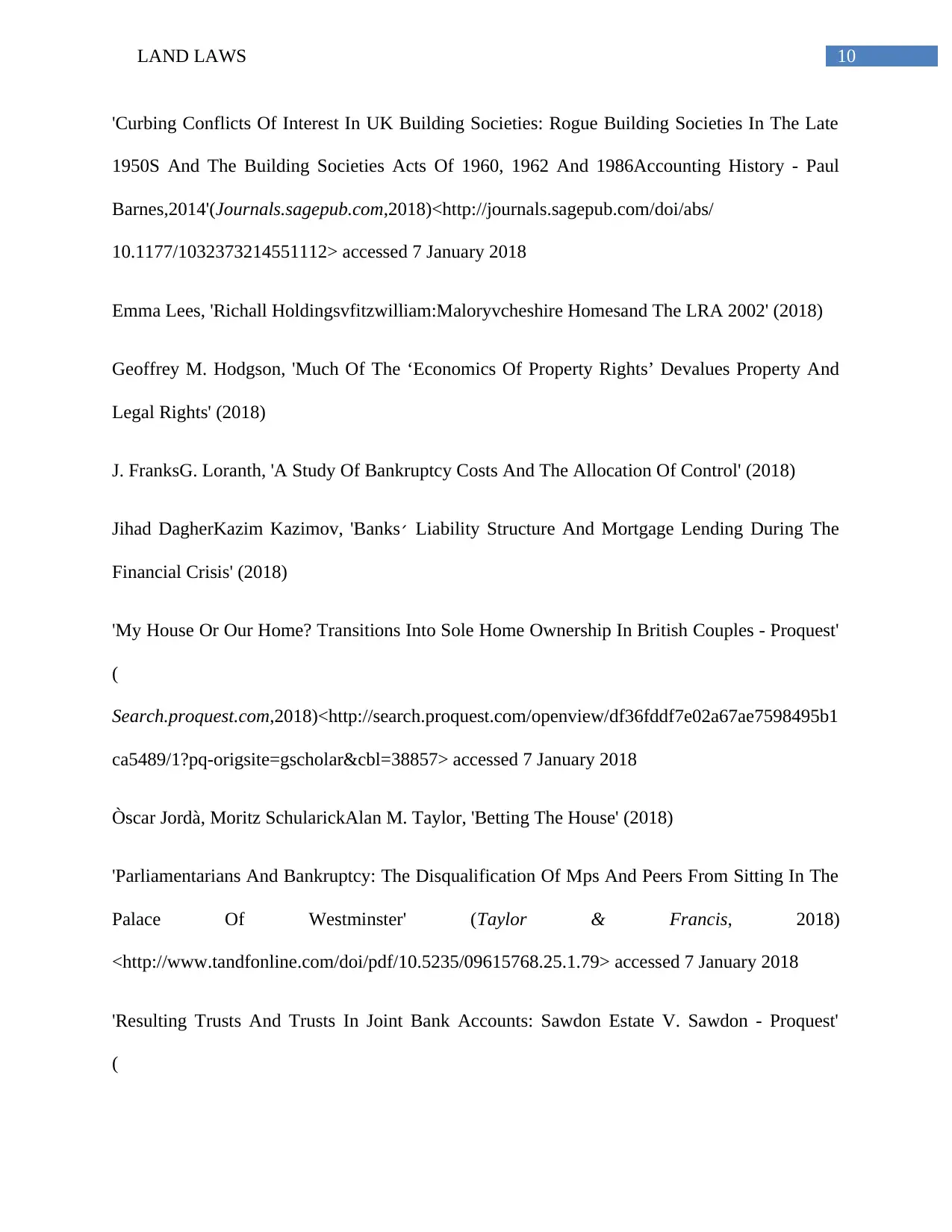
10LAND LAWS
'Curbing Conflicts Of Interest In UK Building Societies: Rogue Building Societies In The Late
1950S And The Building Societies Acts Of 1960, 1962 And 1986Accounting History - Paul
Barnes,2014'(Journals.sagepub.com,2018)<http://journals.sagepub.com/doi/abs/
10.1177/1032373214551112> accessed 7 January 2018
Emma Lees, 'Richall Holdingsvfitzwilliam:Maloryvcheshire Homesand The LRA 2002' (2018)
Geoffrey M. Hodgson, 'Much Of The ‘Economics Of Property Rights’ Devalues Property And
Legal Rights' (2018)
J. FranksG. Loranth, 'A Study Of Bankruptcy Costs And The Allocation Of Control' (2018)
Jihad DagherKazim Kazimov, 'Banks׳ Liability Structure And Mortgage Lending During The
Financial Crisis' (2018)
'My House Or Our Home? Transitions Into Sole Home Ownership In British Couples - Proquest'
(
Search.proquest.com,2018)<http://search.proquest.com/openview/df36fddf7e02a67ae7598495b1
ca5489/1?pq-origsite=gscholar&cbl=38857> accessed 7 January 2018
Òscar Jordà, Moritz SchularickAlan M. Taylor, 'Betting The House' (2018)
'Parliamentarians And Bankruptcy: The Disqualification Of Mps And Peers From Sitting In The
Palace Of Westminster' (Taylor & Francis, 2018)
<http://www.tandfonline.com/doi/pdf/10.5235/09615768.25.1.79> accessed 7 January 2018
'Resulting Trusts And Trusts In Joint Bank Accounts: Sawdon Estate V. Sawdon - Proquest'
(
'Curbing Conflicts Of Interest In UK Building Societies: Rogue Building Societies In The Late
1950S And The Building Societies Acts Of 1960, 1962 And 1986Accounting History - Paul
Barnes,2014'(Journals.sagepub.com,2018)<http://journals.sagepub.com/doi/abs/
10.1177/1032373214551112> accessed 7 January 2018
Emma Lees, 'Richall Holdingsvfitzwilliam:Maloryvcheshire Homesand The LRA 2002' (2018)
Geoffrey M. Hodgson, 'Much Of The ‘Economics Of Property Rights’ Devalues Property And
Legal Rights' (2018)
J. FranksG. Loranth, 'A Study Of Bankruptcy Costs And The Allocation Of Control' (2018)
Jihad DagherKazim Kazimov, 'Banks׳ Liability Structure And Mortgage Lending During The
Financial Crisis' (2018)
'My House Or Our Home? Transitions Into Sole Home Ownership In British Couples - Proquest'
(
Search.proquest.com,2018)<http://search.proquest.com/openview/df36fddf7e02a67ae7598495b1
ca5489/1?pq-origsite=gscholar&cbl=38857> accessed 7 January 2018
Òscar Jordà, Moritz SchularickAlan M. Taylor, 'Betting The House' (2018)
'Parliamentarians And Bankruptcy: The Disqualification Of Mps And Peers From Sitting In The
Palace Of Westminster' (Taylor & Francis, 2018)
<http://www.tandfonline.com/doi/pdf/10.5235/09615768.25.1.79> accessed 7 January 2018
'Resulting Trusts And Trusts In Joint Bank Accounts: Sawdon Estate V. Sawdon - Proquest'
(
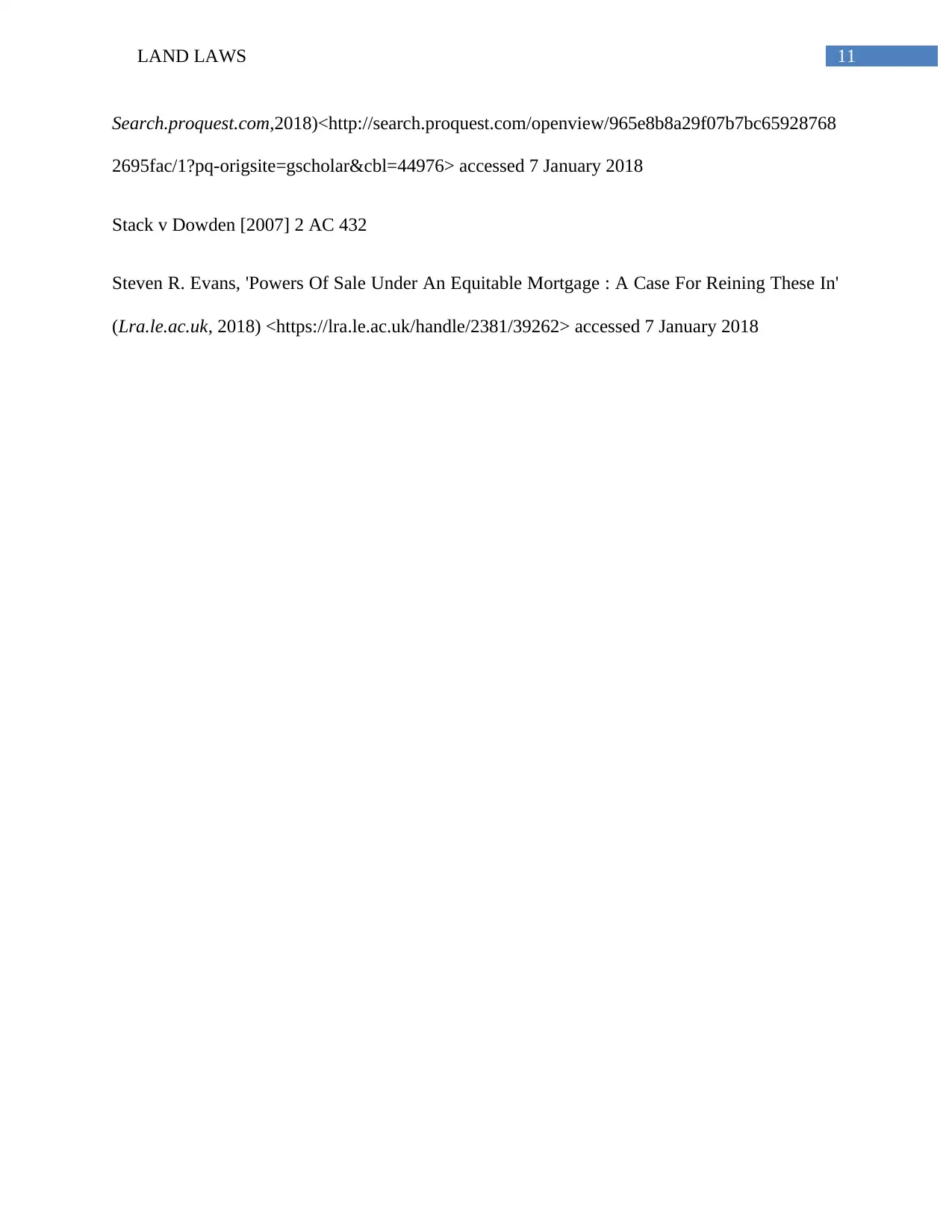
11LAND LAWS
Search.proquest.com,2018)<http://search.proquest.com/openview/965e8b8a29f07b7bc65928768
2695fac/1?pq-origsite=gscholar&cbl=44976> accessed 7 January 2018
Stack v Dowden [2007] 2 AC 432
Steven R. Evans, 'Powers Of Sale Under An Equitable Mortgage : A Case For Reining These In'
(Lra.le.ac.uk, 2018) <https://lra.le.ac.uk/handle/2381/39262> accessed 7 January 2018
Search.proquest.com,2018)<http://search.proquest.com/openview/965e8b8a29f07b7bc65928768
2695fac/1?pq-origsite=gscholar&cbl=44976> accessed 7 January 2018
Stack v Dowden [2007] 2 AC 432
Steven R. Evans, 'Powers Of Sale Under An Equitable Mortgage : A Case For Reining These In'
(Lra.le.ac.uk, 2018) <https://lra.le.ac.uk/handle/2381/39262> accessed 7 January 2018
⊘ This is a preview!⊘
Do you want full access?
Subscribe today to unlock all pages.

Trusted by 1+ million students worldwide
1 out of 12
Related Documents
Your All-in-One AI-Powered Toolkit for Academic Success.
+13062052269
info@desklib.com
Available 24*7 on WhatsApp / Email
![[object Object]](/_next/static/media/star-bottom.7253800d.svg)
Unlock your academic potential
Copyright © 2020–2026 A2Z Services. All Rights Reserved. Developed and managed by ZUCOL.





